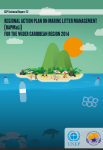The UN Environment Programme (UNEP) released a report, titled ‘Regional Action Plan for Marine Litter (RAPMaLi) for the Wider Caribbean Region (WCR) 2014,' in concert with World Oceans Day.
The RAPMaLi aims to provide a comprehensive toolkit to assist small island developing States (SIDS) to incorporate waste management across all sectors.
 June 2016: The UN Environment Programme (UNEP) released a report, titled ‘Regional Action Plan for Marine Litter (RAPMaLi) for the Wider Caribbean Region (WCR) 2014,’ in concert with World Oceans Day. The RAPMaLi aims to provide a comprehensive toolkit to assist small island developing States (SIDS) to incorporate waste management across all sectors.
June 2016: The UN Environment Programme (UNEP) released a report, titled ‘Regional Action Plan for Marine Litter (RAPMaLi) for the Wider Caribbean Region (WCR) 2014,’ in concert with World Oceans Day. The RAPMaLi aims to provide a comprehensive toolkit to assist small island developing States (SIDS) to incorporate waste management across all sectors.
UNEP’s Caribbean Regional Coordinating Unit (UNEP-CAR/RCU) produced the report with financial support from UNEP’s Regional Seas Programme and the UNEP Global Programme of Action. The report brings together information on marine litter in the region and includes country profiles and case studies.
The majority of marine litter in the Caribbean region is from shoreline and recreational activities, with plastic beverage bottles accounting for nearly 20% of total litter, according to the report. Plastic and paper bags comprise nearly 17% of marine litter, followed by caps and lids (11.4%), utensils, cups and plates (9.6%), cigarettes (8.4%) and glass beverage bottles (8.3%). The report argues that this data supports the need to create a recycling program for plastic bottles and other litter that end up in the Caribbean’s oceans.
The report addresses waste management actions in: legislation, policies and enforcement; institutional frameworks and stakeholder involvement; monitoring programmes and research; education and outreach; and solid waste management. It recommends specific actions related to implementing existing legislation and enacting new legislation, where appropriate. It highlights problems and impacts associated with marine litter, including the emergence of microplastics as a health concern.
The report recommends establishing national marine litter monitoring programmes to ensure continuous assessment of coastal areas and seas. It further recommends, inter alia: creating more recycling programmes and monitoring their impact; continuing to identify high risk and priority areas; raising awareness on the problem of marine litter; and engaging policymakers and other stakeholders to create a comprehensive approach across sectors and ministries.
The report provides an update to a 2008 report, titled ‘Marine Litter in the Wider Caribbean: A Regional Overview and Action Plan,’ which UNEP produced as part of a project to respond to growing global concerns of litter accumulation in the oceans. The number of countries participating in the program has increased from the 14 countries included in the original report to 20 in the 2014 report. [UNEP Publication Website] [Publication: Regional Action Plan for Marine Litter (RAPMaLi) for the Wider Caribbean Region 2014] [IISD RS Story on World Oceans Day]